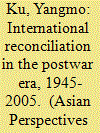| Srl | Item |
| 1 |
ID:
155470


|
|
|
|
|
| Summary/Abstract |
What explains Japan’s security behavior? As an economically powerful state without commensurate military capabilities, Japan has long puzzled theorists of international relations. To explain this puzzle, many scholars have put forth arguments focusing on Japanese domestic institutions and anti-militarist ideas. In contrast, I argue that Japan’s security ‘production’ is primarily driven by two key variables: the regional threat environment and the strength of security commitment from its ally and great power patron, the United States. These two factors vary and interact in ways that determine Japan’s level of security, which drives its security policy. These arguments are illustrated through a longitudinal analysis of Japan’s security behavior, comprised four temporal ‘cases’ running from 1960 to the present day.
|
|
|
|
|
|
|
|
|
|
|
|
|
|
|
|
| 2 |
ID:
085292


|
|
|
|
|
| Publication |
2008.
|
| Summary/Abstract |
Under what conditions do sets of two former adversary states with deeply rooted historical animosity try to reconcile with each other? When they seek bilateral reconciliation, why are the outcomes significantly different? France and Germany were historic antagonists that fought three catastrophic wars between 1870 and 1945. In the postwar era, however, their antagonism and hostility dramatically evolved into mutual partnership and cooperation. Unlike the Franco-German case, Japan-Republic of Korea relations still remain frigid due to mistrust and enmity, although sixty-three years have passed since Korea's liberation from Japanese colonial rule. This article argues that in both cases, the motives for reconciliation were mainly derived from realpolitik concerns such as security and economy. Structural conditions also affected the initiation of international reconciliation. Nonetheless, it was the dynamics of political leaders and nongovernmental organizations that played central roles in differentiating the reconciliation processes and outcomes in the two dyadic relationships.
|
|
|
|
|
|
|
|
|
|
|
|
|
|
|
|